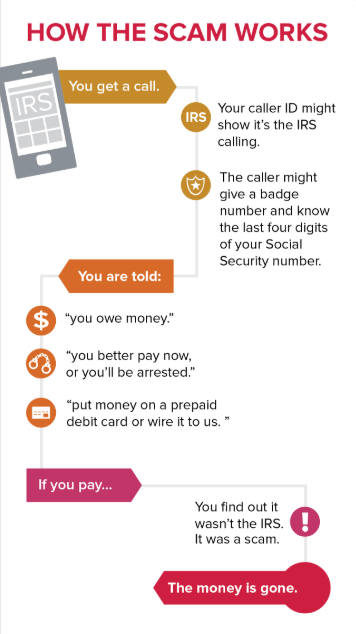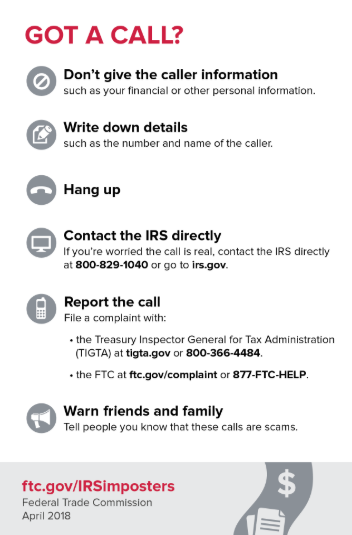It can be intimidating to receive phone calls that claim to be from the government. Some of these calls can be threatening, while others offer false opportunities for government grants or entitlements. Calls and scams impersonating the government have been on the rise since 2014. The IRS scam, impersonating the Internal Revenue Service, has ranked as the number one reported scam in Vermont since, making up 41% of the top scams reported to CAP in 2018. Last year, the social security number phishing scam (SSN), impersonating the Social Security Administration, was the second highest reported scam, making up 18% of the top scams. Together, the two government imposter scams were 59% of the top scams reported in Vermont. This year, the SSN scam is on track to be number one, with 755 already reported to CAP. Recognize common government impersonation scams.
SSN Phishing and IRS Scams

Identify It: Scammers claiming to be government offices, like Social Security Administration or the Internal Revenue Service may claim your SSN has been compromised, or that you have back taxes.
What to Know: It is important to remember that these government agencies would never contact you over the phone or through email. These agencies mail communications and would never threaten you for information or payment over the phone.
Treasurer’s Office Scam
Identify It: Government scams can come in many different forms other than the well-known IRS and SSN scam. Recently, CAP has been notified about a scam call that claims to be from the State Treasurer and that the recipient owes money related to student loan debt.
What to Know: Spot this scam by looking out for debt calls that threaten legal action if payment information is not given.
Government Grant Scam
Identify It: Sometimes, government impersonators claim that you are eligible for a federal grant. They say things like, “Because you do not owe back taxes, you qualify for a government grant.”
What to Know: If you did not apply for a grant, you shouldn’t be contacted. You would never have to pay for fees or taxes before receiving a grant. Watch out for false claims that you are entitled to something that you never knew about.
Spoofing Government Numbers
Identify It: Scammers may sometimes use technology known as spoofing. This is when they mask their actual phone number so that your caller ID will show you a different number entirely.
What to Know: Sometimes they will use this to make their number look like they are coming from your area code, while other times the caller ID on your phone may even show as “US Government,” “IRS,” or “SS administration”.

If you suspect that you are being targeted by a scam, the best thing you can do is not respond. If you answered the phone, then hang up. If you have been emailed, do not respond. Do not call back any numbers that you are given. Never give out your personal or financial information to an unknown party claiming to be the government. If you are worried that some claims may be legitimate, call the department directly, using a number you know to be valid.
If you would like to report a scam or have any questions, please reach out to CAP by calling us at 1-800-649-2424 or emailing AGO.CAP@Vermont.gov
For more information about government imposter scams, please check out the FTC’s guide on how to recognize these scams and tips on combatting them: https://www.consumer.ftc.gov/articles/0048-government-imposter-scams
Contributing Writer: Mollie Shea Feeley
Content Editor: Crystal Baldwin
Sources:
https://www.consumer.ftc.gov/articles/0048-government-imposter-scams
https://www.consumer.ftc.gov/blog/2019/07/whos-pretending-be-government-now
Infographic source: https://www.consumer.ftc.gov/articles/0519-irs-imposter-scams-infographic)
